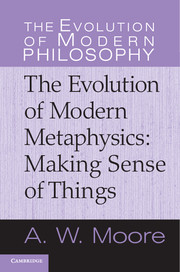Book contents
- Frontmatter
- Contents
- Preface
- Introduction
- Part One The Early Modern Period
- Part Two The Late Modern Period I
- Part Three The Late Modern Period II
- Chapter 15 Nietzsche
- Chapter 16 Bergson
- Chapter 17 Husserl
- Chapter 18 Heidegger
- Chapter 19 Collingwood
- Chapter 20 Derrida
- Chapter 21 Deleuze
- Conclusion
- Bibliography
- Index
Chapter 17 - Husserl
Making Sense of Making Sense; or, The Ne Plus Ultra of Transcendentalism
from Part Three - The Late Modern Period II
Published online by Cambridge University Press: 05 June 2012
- Frontmatter
- Contents
- Preface
- Introduction
- Part One The Early Modern Period
- Part Two The Late Modern Period I
- Part Three The Late Modern Period II
- Chapter 15 Nietzsche
- Chapter 16 Bergson
- Chapter 17 Husserl
- Chapter 18 Heidegger
- Chapter 19 Collingwood
- Chapter 20 Derrida
- Chapter 21 Deleuze
- Conclusion
- Bibliography
- Index
Summary
Husserl Vis-à-Vis the Analytic Tradition
Towards the end of Chapter 12 I argued that Quine’s extreme naturalism, whereby the only way to make sense of things is the (natural-)scientific way, failed because that is not the way to make sense of making sense of things. Invoking Neurath’s image of the ship, which Quine himself was so fond of invoking, and taking the ship to represent those of our beliefs that we arrive at by (natural-)scientific means, I suggested that understanding how we arrive at these beliefs, in contrast to actually arriving at them, requires something of an altogether different kind from staying on board and ensuring that the ship’s parts are in proper working order; it requires jumping overboard and looking at the ship from the outside.
I shall not dwell on this analogy. It has several defects. (Not least of these is its implication that what is wrong with a naturalistic attempt to make sense of how we make sense of things is that it is not sufficiently detached from its subject matter. In due course we shall see reason to regard this implication as the very reverse of the truth.) The crucial point is that a standard scientific investigation of how sense is made of things, even an investigation that belongs to the psychological or social sciences, cannot account for the rudimentary way in which the things of which sense is made do not just affect the sense that is made of them, but manifest themselves in it; do not just cause the making of that sense, but are given in it; do not just stand in certain relations to the sense-maker, but are made sense of as so standing.
- Type
- Chapter
- Information
- The Evolution of Modern MetaphysicsMaking Sense of Things, pp. 429 - 458Publisher: Cambridge University PressPrint publication year: 2011

